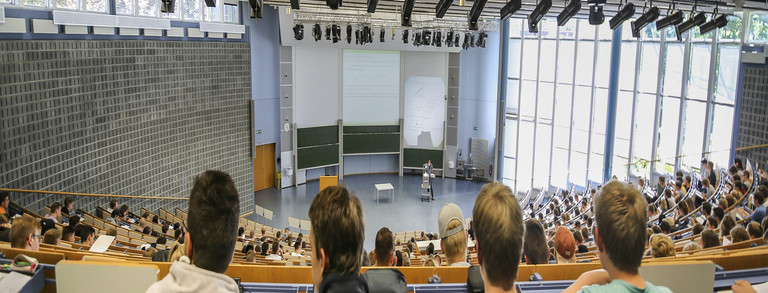Technomathematics
Summary
| Degree | Bachelor of Science (B.Sc.) |
|---|---|
| Subject group | Natural Sciences and Computer Sciences |
| Standard program duration | 6 semesters |
| Admission requirements |
none
|
| Start of studies |
Winter semester
Summer semester |
| Language | German |
| Further information | Website of Department of Mathematics |
Overview
Many technical processes are not initially implemented in practice, but rather simulated in computers. For example, in order to find out how long a component can withstand mechanical loads and when it will first start to crack, it is not necessary to perform destructive testing of the actual, often expensive components or machines; instead, the answers being sought can be obtained through models and simulations. Here, technomathematicians take part in intelligent product development, for example by creating and optimizing complex simulations.
The Bachelor’s degree program leads to a first professional qualification; it also prepares the graduate to pursue a Master's degree in (Techno)Mathematics. The initial phase of the program imparts the fundamental mathematical content and methods in the areas of analysis and linear algebra and runs parallel to the mathematics program; in addition, the basics of computer science are covered. Beginning in the second year of study, introductory software courses are offered as block courses (1-2 weeks) during the lecture-free periods. Later, elements of numeric and optimization in particular are added to prepare for topics in mathematical model building and scientific computing. Another core activity for professional qualification is the study project "Modeling and Simulation." Here the competences of independent scientific work and project work are integrated, together with the ability to implement technical programs in work groups and make effective presentations. The projects should be closely relevant to problems in science or engineering. The goals of the project are to work out a specific topic in technomathematics, create software in a collaborative group, and sharpen skills in written and oral presentation.
In addition to mathematics, a minor subject related to Technomathematics is studied. Here students familiarize themselves with the basics of another subject and encounter examples of how its problems can be dealt with mathematically. At present, the minor can be chosen from the following subjects:
- Structural Mechanics and Statics
- Chemistry
- Electrical Engineering and Information Technology
- Physics
- Technical Mechanics.
Other application areas in natural sciences and technology may, upon request, be studied as minor subjects.
Skills and knowledge
The Bachelor’s degree program in Technomathematics is aimed at high school graduates who are mathematically talented and have a particular interest in the use of mathematics in the natural sciences and engineering.
In order to be able to better assess your own knowledge of mathematics before starting your studies, you can take an online placement test, for example here.
Those who take such a test early on and thus make an early assessment of their own level of knowledge can, up until the actual start of their studies, work through any problems and gaps revealed by the test, repeat topics, or continue training in the mathematical tools.
It is recommended that students take the preparatory course in mathematics, which repeats material previously covered in school while providing the first experiences with working and living at the university (lectures in the auditorium, accompanying exercises in small groups). The Department of Mathematics usually offers such a three-week preparatory course starting at the end of August or early September.
The Bachelor’s degree program is not subject to admission restrictions.
Field of activity
Technomathematicians are employed in industrial and research sectors where development work is carried out by means of computer-aided simulation, which replaces more costly experimental studies. This includes nearly all branches of production (mechanical engineering, the automobile industry, electrical engineering), logistics, and software development. Like other professional mathematicians, they also often work in management consulting, in public service, and at universities and research institutes. The demand for technomathematicians can be described as expansive, making the prospects for employment very good.




![[Translate to English:] Partner Four hands are holding the green logo of TU Dortmund University](/storages/tu_website/_processed_/1/d/csm_Partner_Nicole_Rechmann_KW_40b35bb3fd.jpg)




![[Translate to English:] Forschung An apparatus with tubes in a laboratory](/storages/tu_website/_processed_/0/c/csm_Forschung_Juergen_Huhn_cbd34afd6d.jpg)
![[Translate to English:] Studium Five students are sitting in a lecture hall. They are talking to each other.](/storages/tu_website/_processed_/c/9/csm_Studium_FelixSchmale_81d94adc86.jpg)





